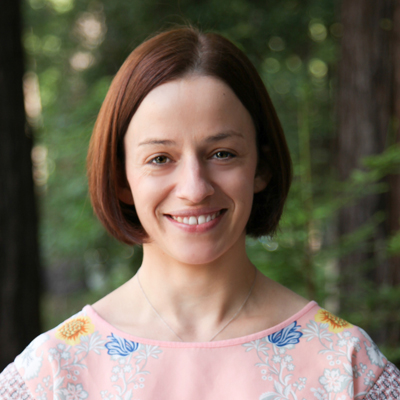Bridging immunology and RNA biology to identify biomarkers and therapeutic targets for chronic inflammatory diseases
Designed to protect our body against infection, when perturbed, our immune system can turn against itself and attack healthy tissue it confuses as harmful bacteria or viruses, leading to debilitating consequences like chronic inflammation. Examples of chronic inflammation include systemic lupus erythematosus (SLE, or lupus) and rheumatoid arthritis (RA), from which about 1.5 million [1] and 1.3 million Americans suffer, respectively [2]. While RA increases the risk of heart diseases by 60 percent, such inflammatory diseases are difficult to diagnose or treat because they mimic symptoms of other diseases; their symptoms are inconsistent; and there are no causes or cures known. Dr. Susan Carpenter, Assistant Professor of Molecular Cell and Developmental Biology at the University of California, Santa Cruz, studies the early immune responses to identify novel regulators of inflammation that will advance the breakthroughs in diagnosis and treatment solutions for chronic inflammation. By understanding in more detail exactly what goes wrong in the signaling pathways particularly in lupus and RA, Dr. Carpenter hopes to identify novel biomarkers and targets for therapeutic intervention. Collaborating with the Rheumatologists at UCSF, UCSD and UMASS Medical School for clinical samples, Dr. Carpenter brings together clinical and basic science investigators to address significant questions promising a clinical impact.
Because the initial driver of this inflammation remains unknown, Dr. Carpenter hopes to elucidate the triggers and mechanisms that will help diagnose the problem more easily. While researchers have spent decades trying to understand proteins involved in chronic inflammation, Dr. Carpenter’s new lab -- established in July, 2015 -- takes a novel approach based on the fact that the majority of the human genome produces RNA. Dr. Carpenter is particularly interested in understanding the functions of the largest group that gets produced in the genome called the long noncoding RNA (lncRNA for short), in controlling inflammation. As there are 16,000 lncRNAs in the human genome and to date only 1% of these genes have ascribed functions, Dr. Carpenter believes that understanding how lncRNAs can impact and influence the regulation of chronic inflammatory diseases such as lupus and RA can also help determine whether lncRNAs are viable candidates for diagnosis and targets for therapeutic interventions.
To date, Dr. Carpenter and her lab have projects at a number of different stages:
- Dr. Carpenter’s most advanced project is focused on the characterization of lincRNA-Cox2. LincRNA-Cox2, a form of long intergenic non-coding RNAs, can form a complex with the protein hnRNPA2B1, which is a known autoantigen identified in patients suffering from lupus or RA. The Carpenter Lab is now studying how these genes might contribute to the pathogenesis of disease, and has found that if lincRNA-Cox2 or hnRNP-A2B1 is removed from macrophages (a type of white cells important in immune response) in culture, there is a significant increase in interferon stimulated genes (ISGs), which is a signature associated with patients suffering from lupus. Dr. Carpenter has thus generated animal models and is currently testing them in models of chronic inflammation.
- The Carpenter lab has projects that are at earlier stages of investigation. For example, Dr. Carpenter and her team have identified hundreds of lncRNAs that are dysregulated following inflammatory stimulation. Now the team plans to profile lncRNAs from patients with lupus and RA to see if they can be utilized as novel biomarkers of disease. In addition, the team has generated inflammatory reporter lines that they will use for high throughput studies to understand which lncRNAs they find in the profiling studies are actively involved in the regulation of inflammation.
Bio
Dr. Susan Carpenter is Assistant Professor of Molecular Cell and Developmental Biology at the University of California, Santa Cruz who graduated from Trinity College in Dublin, Ireland with a Ph.D. in Biochemistry and Immunology in 2009 where she worked under the supervision of Professor Luke O’Neill studying novel proteins important within innate immune signaling pathways. Prof. Luke O’Neill is one of the world leaders in the field of Innate Immunity and under his tutelage, she became passionate about understanding the complexities of the innate immune system.
She carried out her postdoctoral work with Prof. Kate Fitzgerald at UMASS Medical School, another leader in the field of Innate Immunity. Her postdoctoral research continued in this area, focusing her attention on the role of long noncoding RNA (lncRNA) in inflammatory signaling pathways. Since her research bridges the fields of immunology and RNA biology, she took the opportunity to work in the laboratory of Dr. Michael McManus at University of California, San Francisco (UCSF), who was one of the first researchers in the world to develop RNA interference and whose lab has a very strong technology component, which attracted Dr. Carpenter to their research. While at UCSF, Dr. Carpenter worked on developing high throughput genomic approaches to study lncRNA. Dr. Carpenter’s ultimate research goals are to provide critical and novel insights into how our immune system responds to infection with the aim to identify novel drug targets leading to improved therapeutics for infectious and autoimmune diseases.
As she herself suffers from asthma which is an inflammatory condition and comes from a family with a long history of arthritis, Dr. Carpenter has both academic and personal motivation for advancing her research.
Outside of research, Dr. Carpenter plays classical piano. She also has a black belt in karate but doesn’t have enough time to train anymore. However, she still stays physically active in sunny California jogging and hiking.
For more information, visit https://sites.google.com/a/ucsc.edu/carpenter-lab/

In the News
Diabetes Center, UCSF
Publications
Awards
Invited speaker at the Annual meeting of the American College of Rheumatology, 2015
San Francisco, CA
Invited speaker at the Mid Winter Conference for Immunologists, 2015
Asilomar, CA
Named the Sontag Foundation Fellow, 2014
Arthritis National Research Foundation
Winner of the Centro Stefano Franscini award for best presentation by a young scientist, 2012
EMBO workshop ‘The reciprocal interactions of signaling pathways and noncoding RNA’ , 2012
Recipient of the ‘Roche Researcher of the Year Award’, 2009
Patents
PCT Application No. WO 2008/046902: "Compounds for the modulation of Toll-like receptor function and assay methods for identification of said compounds"
Susan Carpenter, Aisling Dunne, Luke A.J O’Neill. Filed October 2007.
Provisional European Patent Application No. P107318.EP.01: "Compounds and Methods for the Treatment of Inflammatory Diseases"
Susan Carpenter and Luke A.J O’Neill. Filed September 2008.


